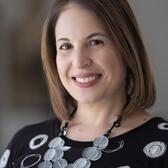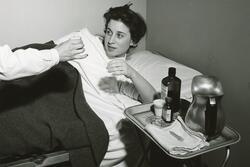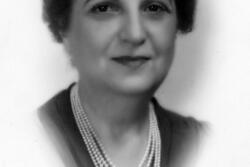From the Archives: Saturday Luncheon Club
This article is part of the series From the Archives. From the Archives highlights primary sources that have changed the course of history, for an individual, a community, or the world.
The Jewish Federation of Metropolitan Detroit sits on a busy eight-lane highway in Bloomfield Hills, Michigan. While archives are often relegated to dark basements, my office resides on the third floor of the building, with a large window overlooking the street.
I sometimes find myself staring at the parking lot across the street from my office, and it’s not because I’m daydreaming. Instead, I’m thinking about how on July 30, 1975, Jimmy Hoffa disappeared from that lot. Back then it was the parking lot for the Red Fox restaurant. Something about the spot transports me back 43 years. It isn’t a morbid fascination with one of the country’s greatest unsolved mysteries; rather, it’s my belief that everything around us has a past and a story to tell. It’s just waiting for someone to tell it. With the wonders of social media, I have a place to ponder the fate of Jimmy Hoffa and share anecdotes that I find in the archives. In 1921, a group of women with curious minds found a different method to uncover and share stories: The Saturday Luncheon Club (SLC).
Back then, there was no Facebook or Twitter or blogs. News was shared in newspapers and on the radio – industries that mainly employed men. If you were a woman, you went from the classroom to your husband’s home, leaving few opportunities for intellectual pursuits.
The SLC changed that for the women of Detroit. As described by some of the founding members, the idea was initiated by Rabbi Leo M. Franklin of Temple Beth El. He proposed to his daughter Ruth, a graduate of Vassar, that she and other young women meet on a regular basis and present papers on subjects of interest that would build friendships and constitute a kind of self-directed adult education. In addition to Ruth, the founding members included Regene Freund, Carolyn Epstein, Rae Finsterwald, Minnie Goldsmith, Delia Imerman, and Irene Rosenberg.
New members were invited by invitation only after a nominating process that included sponsorship, a written proposal, and a vote. The candidates were generally active in the community and members of organizations like Hadassah and National Council of Jewish Women. Many were college educated.
Only a few papers were presented each month. Going in alphabetical order, women generally presented once every four to five years. This left plenty of time to create a well-researched and engaging paper. The subjects members presented ranged from personal experience, like travel, to hard-hitting subjects, such as the Korean conflict, the rift between China and Russia, and an improvement plan for city schools. Some papers focused on the individual’s personal beliefs and passion projects, like Margaret Kaichen’s 1950 paper on Planned Parenthood, on whose board she served.
Now a rich resource, the papers are not only a reflection of the women who presented them, but also a historic record of the time, told from the perspective of those who weren’t given a mainstream voice. In the 1940s, papers addressed the most pressing issue at hand: the plight of European Jews. In 1943, Josephine Weiner’s “The Disposed” discussed what would happen to European Jews post-war. While the paper makes astute observations and looks ahead to the end of WWII, it is also a record of the misinformation (and lack of information) coming out of Europe. In the paper, Weiner laments that only three million of the four million Jews in Europe at the time would be alive after the war. One can imagine how staggering those numbers must have been in 1943. Or how shocking the real numbers were to these women a couple years later: of the nine million Jews who lived in German-Occupied Europe pre-war, only one out of three survived the war.
At the conclusion of the war in 1945, Ada Glazer presented a paper that did not address Europe, but rather than concern of growing Nazism in Argentina. In the “The Argentine,” Glazer cites the history of anti-Semitism in Argentina and expresses concern about the country being a safe haven for Nazi ideals. History would validate her fears, as some of the most notorious Nazi war criminals hid in Argentina and surrounding countries after the war.
The SLC is still going strong today, 97 years after it was founded. It is still a club of bonding and friendship. It is still a place to learn and share the stories that might otherwise go untold. Within the four walls of their monthly meeting, knowledge is power and no subject is off limits. Perhaps one day someone in this group will even solve the mystery of Jimmy Hoffa’s disappearance. With these clever women, anything is possible.
As Josephine Weiner noted in 1987, “We live in a throw-away society where much that we knew, inherited, and treasured in earlier days has been tossed on the rubbish heap. Instead of precious manuscripts, our age has a plethora of print-outs. Brain power is supplanted by Atari computers; linens abandoned for Kleenex; and statesmen displaced by paper tigers. How remarkable that the Saturday Luncheon Club persists! ... Its members, still consciously a breed apart, continue to agonize over the papers they present…”
Note: The Saturday Luncheon Club Records are deposited at the Leonard N. Simons Jewish Community Archives, Bloomfield Hills, Michigan.








Wonderful blog, Robbie. Thanks!